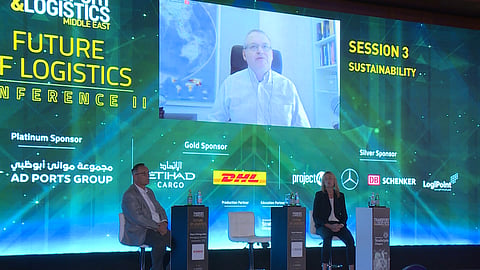Collaboration and Competition Can Create Sustainable Supply Chains
How can the Transport and Logistics sectors collaborate to realize their sustainability goals? This was one of the issues put forward by TLME Chairman Joe Beydoun and discussed in detail by the panellists at the Future of Logistics Conference Part II held recently in Dubai.
Partner & CEO of Vespucci Maritime and container-shipping industry expert, Lars Jensen, was of the opinion that industry players should “compete” on building the most efficient ships and engines as quickly as possible in order to create more sustainable supply chains.
What companies can collaborate on, was creating a common set of standards and accounting systems that can be trusted across the industry to give a true picture on sustainable shipping. In this way the people who buy green TEU miles can actually trust that they are getting the genuine green freight miles and not just getting a “green washing”.
Giving an example Mr Jensen pointed to the MRV Regulations in the EU under which shipping lines are required to report their CO2 emissions in a given year. On a per-vessel basis, CO2 emissions be tracked fairly accurately. However, to track emissions of a single container that moves from point A to B on a given vessel becomes much more complicated.
“Right now, nobody is (accurately) counting (CO2 emissions) but that system has to come in place otherwise its going to be a free for all and you are going to see too much green washing going forward,” concluded Mr Jensen.
Hans Ettengruber, CEO of DIMOS FZE quoted an old and common saying in Germany: “We should do good things and talk about.” By highlighting their sustainability initiatives companies can differentiate themselves from the competition and “attract more customers” who are environmentally conscious.
However, at a more personal level, Mr Ettengruber emphasised that everything starts with taking sustainable initiatives in your own day-to-day life and bringing that philosophy to bear in your company’s operations.
Mary Oxley, VP Markerting & Sales- MEA at DHL Global Forwarding, highlighted the importance of industry-wide standards and adherence to the same. Miss Oxley was of the opinion that when companies and sectors worked together, they should “share secrets.”
Unless we can all collaborate, communicate, and inspire each other to drive change “we will not have a planet to drive that change for going forward,” said Ms Oxley, making a very important point.
Ourselves and our children will be the ones who will be left with a price to pay unless we start to share sustainable solutions and ideas that can benefit industry – and the planet – as a whole.
Ms Oxley concluded by saying that in the end it all comes down to putting your money where your mouth is by making investments, setting up the right KPIs and reporting your progress on the same with honesty and integrity.
Watch More: Port Congestion to Get Worse as Shipping Ops Normalise: Lars Jensen


